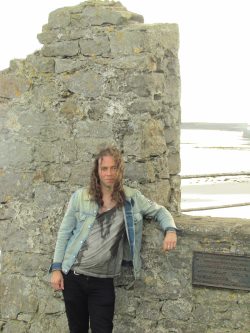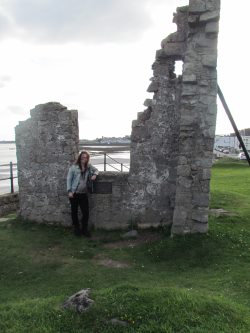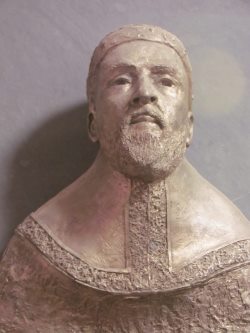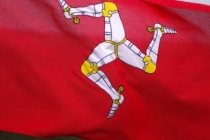Interview with John Callow on Illiam Dhône
We put the following questions about Manx nationalist and political martyr Illiam Dhône to acclaimed historian John Callow. For more information on Illiam Dhône and the historical context in which he lived, read our introduction to Illiam Dhône.
1. Why do you think Illiam Dhône took the actions that he did and which eventually led to his execution?

The English Civil War (1642–1651) had placed enormous strains upon the Manx economy and society. The island had been militarised to an unprecedented degree, with the creation of new state of the art artillery forts and gunpowder mills. Conscription was used for these building projects and for sustaining the Earl of Derby's war effort. In addition, the Earl had sought to overturn inheritance law, limit farm leases, and re-assert the centralised control of Stanley authority in almost every aspect of Manx life. The balance between lord and tenant was dramatically redrawn on the Isle, in favour of the rich and the powerful.
It was no surprise, therefore, that there was discontent: or that a rebellion had been attempted before, in 1643. What was surprising, not least to the Stanleys, themselves, was that the rising of 1651 was led by one of their own clients. However, it really shouldn’t surprise us that Illiam Dhône was moved to act in the good of his island home.
He knew full well what could happen to a native Gaelic society when it was visited by English invasion. Tales of (and refugees from) Ireland at the time of both the massacres of 1640 and the Cromwellian conquest of 1649 would have been the source of frightening rumours and first-hand accounts of the cultural and physical devastation wrought by the total collapse of Charles I's government.
The appearance of a Commonwealth fleet off the coast, in 1651, effectively decided matters for him. If he acted quickly, Illiam Dhône and his followers (gathered at his house at Ronaldsway) could hope to maintain the native elites in power and to save and remodel existing Manx institutions in a manner that suited their own people. The alternative was warfare, waged solely on account of the personal vanity of the Stanleys and a final settlement, regardless of whether it was a Royalist or Parliamentarian victory, that would lay the Isle of Man bare of its people, resources and wealth. It is worth remembering, that he had overheard the Countess of Derby saying that she would sell the Manx at “1d. or 2d” a head; and could have been in no doubt that the islanders were being treated not even as pawns – but as mere chattels – in a much larger game.
The speed of his actions, and his popular support among the islanders, ensured complete success and enabled the Manx to negotiate terms with the English army, upon its landing, that circumvented the Stanleys and guaranteed the survival of the House of Keys, an independent judiciary and “traditional” laws and customs. Consequently, Illiam Dhône was able to establish a highly successful form of government, lasting from 1651-58, that rested on three pillars: the native Manx elites, the English garrison, and the clients of Lord Fairfax in the administration at Bishopscourt and Castle Rushen. Only when this alliance broke down, through the personal animus and political incompetence of Governor Chaloner, did Christian find himself in real trouble.
2. Why do you think he garnered such a group of loyal supporters at the time? Who in particular comes to mind when looking at those close to him?

Illiam Dhône had a large network of clients who supported him through thick and thin. Ewan Curghie, William Gawne and John Cayne stand out (they were among almost the third of the House of Keys purged by the returning Royalists in 1662). Edward Christian, a former Governor and the leader of the aborted 1643 rising, was another major figure. However, he tends to be forgotten as his health had been broken after years in a Stanley prison, and he died before he could be brought to trial.
It’s worth trying to imagine the Royalist forts falling one-by-one to the Manx, in 1651, and the gathering of hundreds of Islanders at Ronaldsway, their swearing of oaths before Illiam Dhône and the passing of the fiery cross which raised the whole of Man. It must have been quite a scene!
What is less well known, but very clear from the government sources preserved at the Manx National Museum, is the alliance between his supporters and the younger, radical officers of the Commonwealth Army. When interrogated and really in danger of losing his own life, Lieutenant John Hathorne refused to implicate Illiam Dhône or any of the native Manx, in the rebellion. It must have required enormous courage. The full story is included in my forthcoming work “In So Shifting a Scene,” which forms part of a volume with other contributions to be published by Leicester University celebrating the career of Sir Thomas Fairfax.
3. What do you believe the impact that the execution of Illiam Dhône had on the Isle of Man at the time? On a wider front did it have repercussions on the English legal system?
The execution of Illiam Dhône was a clear warning to anyone on the Isle that the Stanleys were not to be crossed. The 1660s saw a sustained period of reaction: people jailed and evicted from their farms, and the savage persecution of the Quakers. But, it was significant that in ordering the execution of Illiam Dhône, Charles Stanley had taken his power as the Lord of Man to its outer limits. He was acting like a King – and Charles II wasn’t prepared to tolerate the privatisation and violence by his magnates. Only the real king was permitted to use judicial murder (as he did with complete ruthlessness against the old republicans). Consequently, Stanley was able to execute Illiam Dhône but in gaining the displeasure of Charles II, he effectively destroyed his family’s hold upon Man and his own career at court.
However, the loss of power by the Lords of Man was compensated by almost by default, by the Church. What Charles Stanley began, Bishop Barrow continued: it was a savage time to be Manx.
4. What do you believe to be the continued legacy of Illiam Dhône?

Illiam Dhône's legacy is mixed. The appearance of a ballad celebrating his virtues, sung by the Manx within a generation or two of his death, has effectively secured his fame. There was clearly a folk memory that recalled his qualities, ability and championship of the ordinary Manx. When he visited the Isle in the nineteenth century, Walter Scott even overheard his coachman humming it!
Perhaps surprisingly, Illiam Dhône hasn't become for the Manx, the founding figure of their nation in the same way as Owain Glyndwr has for the Welsh; William Wallace for the Scots; and Wolfe Tone has for the Irish. This is largely due to the erosion of the Manx language (there was no counter-cultural idiom in which his story could easily flourish). The worrying fact that he was arraigned for financial corruption by Governor Chaloner; and that he seemed to have turned his coat from Royalist to Parliamentarian, and then, with the Restoration, back again, makes for a complex, nuanced and at times uncomfortable story. This is probably why the two plays written about him, and the competent biography of him written by Jennifer Kewley Draskau, are so equivocal in their judgment of such a major figure in the island’s history. That’s a shame really – though Mona Douglas’ poem about him, written in the Manx language in 1955, does do him justice and continues a powerful literary tradition, that now stretches back more than 300 years.
Illiam Dhône matters, today, because he remained true to, and in large measure, attained his goals on behalf of the native Manx. Very few of his successors can say as much. He preserved the House of Keys , the traditional government and customs of Man, and spared the island from the ravages of war and foreign invasion. In addition, he was prepared to take the consequences of his actions and to die bravely for his beliefs. In this sense, he remains the only political martyr in Man’s thousand year history as a state and is, as Mona Douglas saw him, “Bio dy-bragh ayns skeeallyn t’ eh / Toshiaght jeh ny Manninee! / Alive for ever in stories ... Foremost of Manx people!”.
- Manx
- English





